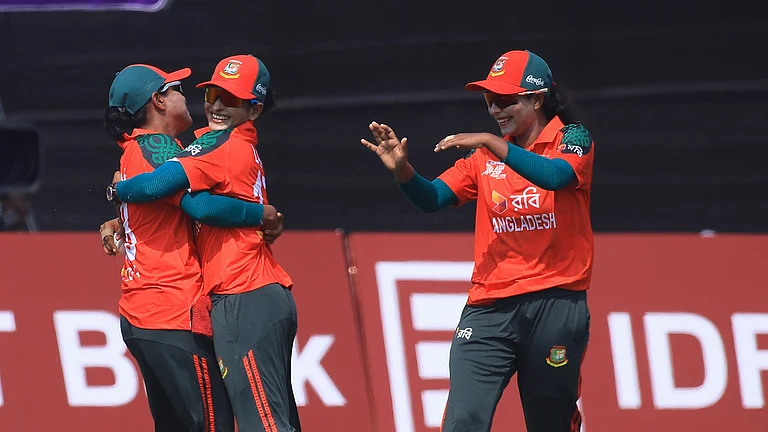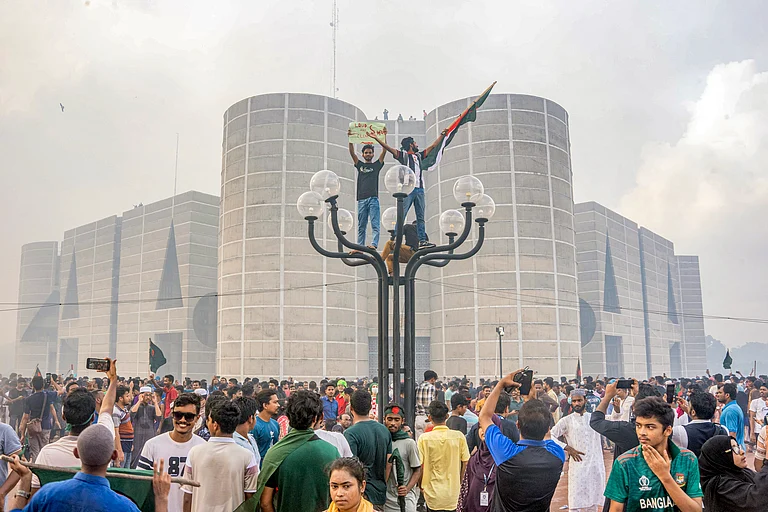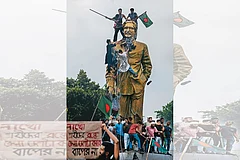When the July 1 high court order reinstating 30 per cent job quotas for freedom fighters’ family members triggered the movement, students initially demanded the abolition of all reservations. However, on July 5, students decided to ask for quota reforms instead of abolition. We agreed that socio-economically disadvantaged communities like tribal groups required reservation but the third generation of freedom fighters do not deserve any reservation.
Thereafter, attacks on student agitators, first on July 15 by the Chhatra League, the student wing of Prime Minister Sheikh Hasina’s Awami League party, and then by the police, July 16 onwards, transformed the movement. It became a movement to fight an authoritarian force trying to silence dissent once again. I, too, was injured in the July 15 attacks and was admitted to the Dhaka Medical College and Hospital after falling unconscious.
It was at this point that the movement spread among the masses. It was an outburst of people’s agitation against 15 years of fascist rule. It turned into a mass movement, with all sections of society joining in.
In this struggle, female students and women played a vital role. Mothers joined the protests to stand by their children not only in Dhaka and other cities but also in the villages in every district. On several occasions, the presence of women in large numbers prevented the police from opening fire. The number of casualties would have been much higher had women not taken to the streets in such large numbers. Female students were involved in all forms of agitation.
Female students did not support the abolition of reservations for women. In a society like Bangladesh, we believe that disadvantaged groups require reservations. We wanted quota reforms. Most female students and even a large number of male students support reservations for women and tribal groups. However, the Supreme Court order in the middle of our agitation discarded not only the freedom fighter quota but also the 10 per cent quota for women. This was not what we wanted.
Now that there is a new student-backed government and things are going to be planned afresh, we hope the new system will include some reservations for disadvantaged groups, including women. We, female students, are going to demand this. This government is a product of the movement against discrimination. Women face different sorts of discrimination in many aspects of social life, including jobs and wages. As a woman, I expect the government to take meaningful steps towards establishing gender equality.
We have seen from our experiences that whoever came to power in the past resorted to discriminatory and authoritarian practices. With Hasina’s fall, other forces are raising their heads. We know that people do not want them either. So, we aim to democratise the system and present them with an alternative to one authoritarian rule replacing another.
At the same time, a lot is being discussed about the future of student politics, with some suggesting student organisations linked to political parties should be banned on campuses. As a student and a conscious citizen, I believe prohibiting or restricting student politics is unhealthy for society. But we have to look at the recent developments in the context of what happened in the past decade and a half.
The ruling party’s student organisation became a terror on the campus, in residential hostels and on the streets. They became a menace. It negatively impacted people’s perception of student politics. There are people who do not want a return of such campus hooliganism. Therefore, many want to ban all major student organisations. People are failing to differentiate between pro-people and anti-people student organisations.
Banning student politics on campus is unacceptable. It will nip in the bud the very possibility of greater reforms that student politics can enforce, just as it did this time. We must also find a way to prevent a rerun of what the Chhatra League did. To my understanding, ensuring a democratic atmosphere on the campus and hostels where all organisations can freely voice their issues should be our aim.
We formed this platform to fight all forms of discrimination – social, political and economic. This platform has emerged through many sacrifices. It embodies people’s hopes and aspirations. We want to stay vigilant to fulfill people’s expectations of reforming the system.
The country is still in a state of turmoil. A new government took charge just about a week ago, but the administration is still in a collapsed state. The police are yet to return to their stations. The army is trying to maintain the law-and-order situation. We have thrown out one fascist regime. But other parties who in the past ruled the country in an authoritarian way are trying to take advantage of the political vacuum.
We have to remain alert about the possibility of the fruits of great sacrifices being hijacked by undemocratic forces. We hope the movement and the government will prevent all conspiracies and give shape to people’s democratic aspirations.
Shahinur Sumi is a post-graduate student at Eden Women’s College in Dhaka. She is the president of the Eden Women’s College unit of Samajtantrik Chhatra Front, a leftist student organisation and a component of the Students Against Discrimination (SAD), the student platform that spearheaded the anti-Hasina uprising in July-August 2024.
(As told to Snigdhendu Bhattacharya)
MORE FROM THIS ISSUE
(This appeared in Print as 'We, the Women')























